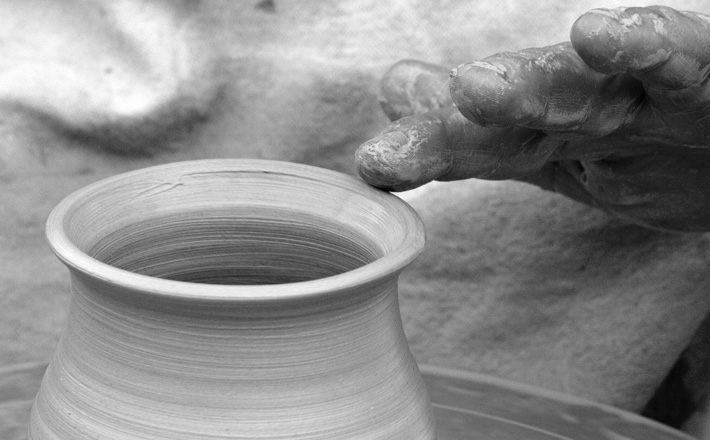Commentary on Psalm 1
This deceptively simple psalm serves as the introduction to the Psalter and sets before us, the readers, a vision of life as a journey marked by bifurcating paths: turn one way, happiness (1:1), another, destruction (1:6).
Our psalmist, to entice us to choose the happy trail, paints the happy life with images stolen from paradise—verdant with plant life, nourished by gentle waters, seasonably fruitful, and unfailingly prosperous (1:3). The psalmist invites us to the royal garden, perhaps atop the Mountain of God, Eden-like. In contrast, he likens the fate of those who choose to turn at the forks of life’s journey time and again toward destruction, not simply to chaff, but to chaff that the discerning wind drives out of the garden into judgment (1:4-5).
The choice would appear clear: reject the path that leads to destruction and choose the other path, the happy life. But where might we find this path to the garden? Dutifully, the psalmist announces:
Happy is the one … [whose] delight is in the law of the LORD,
and [who] on his law meditates day and night. (1:1, 2 author’s translation)
One mystery remains: What is “the law of the LORD,” and what does it require?
The Law of the LORD as the Pentateuch
The Jewish Bible is organized differently from the Christian Old Testament and is comprised of three parts: in order, the Torah (the Pentateuch), the Neviim (most of the historical and prophetic books of the Christian Old Testament), and the Ketuvim (which begins with Psalms and concludes with Chronicles).
In the first chapter of Joshua, the first book of the Neviim, God tells Joshua: “[Act] in accordance with all the law that my servant Moses commanded you … This book of the law … you shall meditate on it day and night … For then you shall make your way prosperous” (Joshua 1:7, 8). In this passage, “this book of the law” refers to Deuteronomy and more expansively to the entire Pentateuch, the Torah. And, if the “way” of Joshua and the nation he now leads is to “prosper,” Joshua will need to “mediate … day and night” on the Torah, the law of the LORD.
The beginning of the Ketuvim, namely Psalm 1, echoes the beginning of the Neviim and likewise highlights the priority and vital importance of the Torah. Repeating words from Joshua, our psalmist proclaims: “Happy is the one … [whose] delight is in the law of the LORD, / and [who] on his law meditates day and night … In all that he does, he will prosper” (1:1, 2, 3 author’s translation). If we are right that Psalm 1 alludes to Joshua 1, then the psalmist’s “law of the LORD” refers to “the law that my servant Moses commanded you … this book of the law,” namely, the Torah.
When we identify the “law of the LORD” with the Torah, we transform Psalm 1 into an interpretative key to the Torah and the Neviim, and vice versa. Our psalm, with Joshua 1, exhorts us to mediate on the Torah for teaching that leads to happiness and, correspondingly, to read the Neviim, the stories of Joshua to Kings and the prophecies of Isaiah to Malachi, as the arena in which the psalmist’s claim that “Happy is the one … ” plays out. How do you learn not to walk in the counsel of the wicked, or stand in the way of sinners, or sit in the seat of mockers? Meditate on the Torah. How happy is a tree planted by streams of water and how miserable the fate of the wicked? Look to the Neviim.
The Law of the LORD as the Psalter
Our psalm echoes Joshua 1 and upholds the importance of the Torah and the Neviim. But we should not forget that Psalm 1 is the introduction to the Psalter. It does not point backward in affirmation only but also forward in anticipation. When the psalmist exhorts us to “mediate on the Law of the LORD day and night,” therefore, he no doubt also exhorts the studied consideration and the impassioned recitation of the Psalter itself. In some sense, the Psalter is the “law of the LORD.”
The Psalter is words spoken by human beings to God in lament, petition, thanksgiving, and praise. So it might seem odd to think of the human words of the Psalter as the law of the LORD. But some have wondered whether the Psalter was not divided into five books (Book I consisting of Psalms 1-41; Book II Psalms 42-72; Book III Psalms 73-89; Book IV Psalms 90-106; and Book V Psalms 107-150) in analogy to the five books of the Torah. It has also been observed that the superscriptions of the psalms invite us to read the Psalter in conjunction with the narratives of the Neviim. For example, superscriptions to many psalms refer to events in David’s life recounted in 1 and 2 Samuel. The Psalter, in this way, brings together the Torah and the Neviim.
However one interprets this complex relationship between Torah, Neviim, and the Psalter, it cannot be doubted that Psalm 1, as an introduction to the Psalter, offers the meditation on the psalms that follow as part of the happiness program. It proclaims: Happy are those who meditate on the psalms day and night.
Meditating on the Psalter
What does it mean to meditate on the psalms?
To meditate on the psalms means first and foremost to speak the human words of each psalm to God, that is, to lament, petition, give thanks, and to praise God day and night. John Calvin rightly called the Psalter “the anatomy of all the parts of the human soul.” What the meditation on the psalms requires, then, is the honest presentation of all the parts of our human soul before God. It requires us to give heartfelt thanksgiving and praise, joining the heavens, the earth, and even the sea. It also requires us to cry aloud from upon the ash heaps—in complaint, in sorrow, in anger, in protest—to God. To borrow words from Kierkegaard, to meditate on the psalms is to choose to will to be ourselves before God, to sing full throated songs of praise when that is appropriate and to give honest articulation to our despair when we are sad. To present our very ordinary selves, our daily selves, to God, that is the advice of the Psalm.
Happy is the one who meditates day and night on the law of the Lord!


September 4, 2016